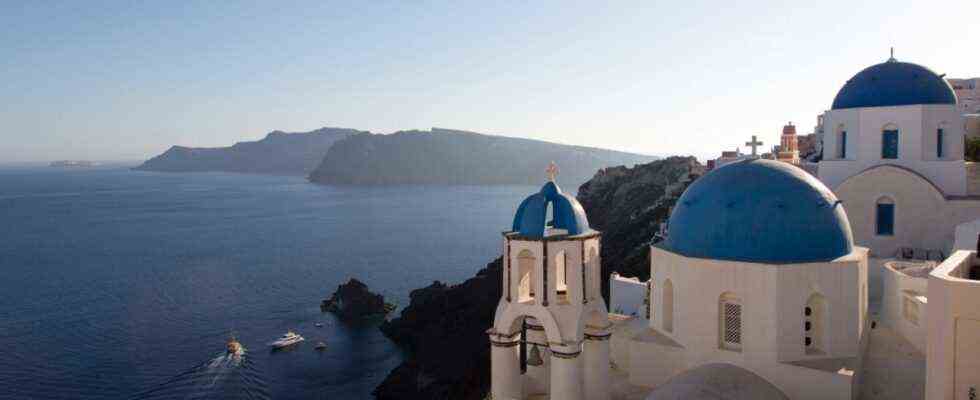Greece never dies, goes a Greek proverb. The small, Balkan country, tried in a thousand battles, has always somehow mastered every crisis. State bankruptcies, economic crisis, financial crisis, national debt crisis, so now the tourism crisis. Last year Greece’s tourism industry was still on the ground like the rubble of an ancient temple, it is now storming towards the sky, despite the ongoing pandemic.
Next to Spain, Greece was the most sought-after travel destination in Europe this summer. According to the tour operator Tui, Crete has replaced Mallorca as the most popular travel destination for Germans for summer holidays in 2021: At the beginning of the season, the Greeks were the first to open up to tourism, and unlike in Spain, for example, the number of infections remained within limits. There was also a coherent hygiene concept. The Greek travel industry is likely to have overcome the corona-related tourism crisis. The arrival of foreign passengers has risen sharply. This year it is only 20 percent below the record year 2019. A good twelve billion euros in revenue are expected in 2021. Last year it was just 4.3 billion euros. “We are breaking one record after another,” said Tourism Minister Vassilis Kikilias.
“The travel season started catastrophically,” says Gerassimos Thimotheatos, President of the Hotel Association of Kefalonia and Ithakas. “Zero tourists in May, even June was sluggish.” But then suddenly the boom set in, which no one had expected, and in August it was impossible to find a room in Kefalonia. “Above all, visitors from neighboring Balkan countries and from Great Britain boosted tourism,” explains Thimotheatos.
Those who got vaccinated got money for their vacation
Naturally, things went even better in Crete, the Cyclades and the Dodecanese, the most popular destinations. Mykonos and Santorini even saw more visitors than in the years before the pandemic. Even small, rather unknown islands such as Amorgos or Donousa were overrun. Especially young Greeks between the ages of 18 and 25 came and partied like there was no tomorrow. No wonder. Those in this age group who were vaccinated received electronic credit from the government that could only be used for hotels, museums, flight and ferry tickets within Greece. Exhausted by the strict quarantine rules and equipped with a state premium of 150 euros, there was no stopping many young people. Prime Minister Mitsotakis called the Covid vaccination campaign “Operation Freedom”. It fueled domestic tourism, which was already doing well. But not every islander was happy about the onslaught. Some could not find peace at night either, as there was so much hustle and bustle in August.
September also went well. The nationwide hotel occupancy was 63 percent. Also in October, it is said, the demand is unusually high. Tour operators and airlines have extended their Greece programs. The German holiday airline Condor will also be flying to Crete in November, because Crete is heavily booked. In short, the summer is being extended, and with it the entire tourist infrastructure. Especially since Greece is always a good time to travel. Winters in the Aegean are humid and mild, but never very cold. The sun is almost always shining. From a purely statistical point of view, Kos, Rhodes and eastern and southern Crete are the most beautiful in terms of the number of hours of sunshine per day. November and December are still pleasantly warm. On average up to 20 degrees. It will not get cooler in the Aegean until January. The Peloponnese, Athens and Attica are also spoiled by the sun. Daytime temperatures between 15 and 20 degrees are normal at the sea in the winter months, as is the case in Athens.
The season will be postponed by a month this year. And not only in the already very popular destinations such as Rhodes, Kos and Crete, but also on the small islands, on which the sidewalks are usually folded up in October and only cats live in some villages. Innkeepers and operators of small guesthouses as well as individual tourists benefit from the extension of the season. Some should make up for the loss of the weak start, while others don’t have to scour the whole town to find an open hotel and restaurant.
Many corona restrictions have now been lifted
After the lost year 2020, the increasing number of visitors means a blessing for the country. Every fifth job depends on tourism. In other words, the Greeks are looking forward to the upcoming autumn holidays in what they hope will be rainy northern Europe. Although the visitors have to be vaccinated, recovered or currently tested negative, the government has lifted many corona restrictions and thus made vacation easier.
But you don’t have to travel to Crete or Rhodes to be able to holiday by the sea in November. Aegina, Methana, Poros, Hydra and Spetses do the same. The places have so many local tourists all year round, they don’t need tour operators, and all hotels and taverns are open in winter. This has the advantage of being mostly among Greeks and so being able to better feel the heartbeat of the country.

